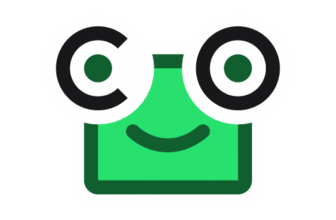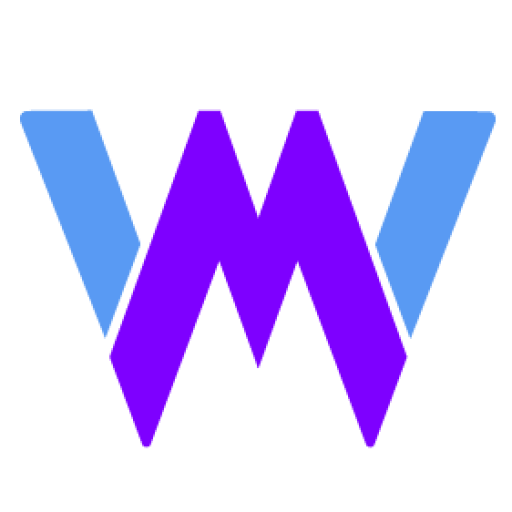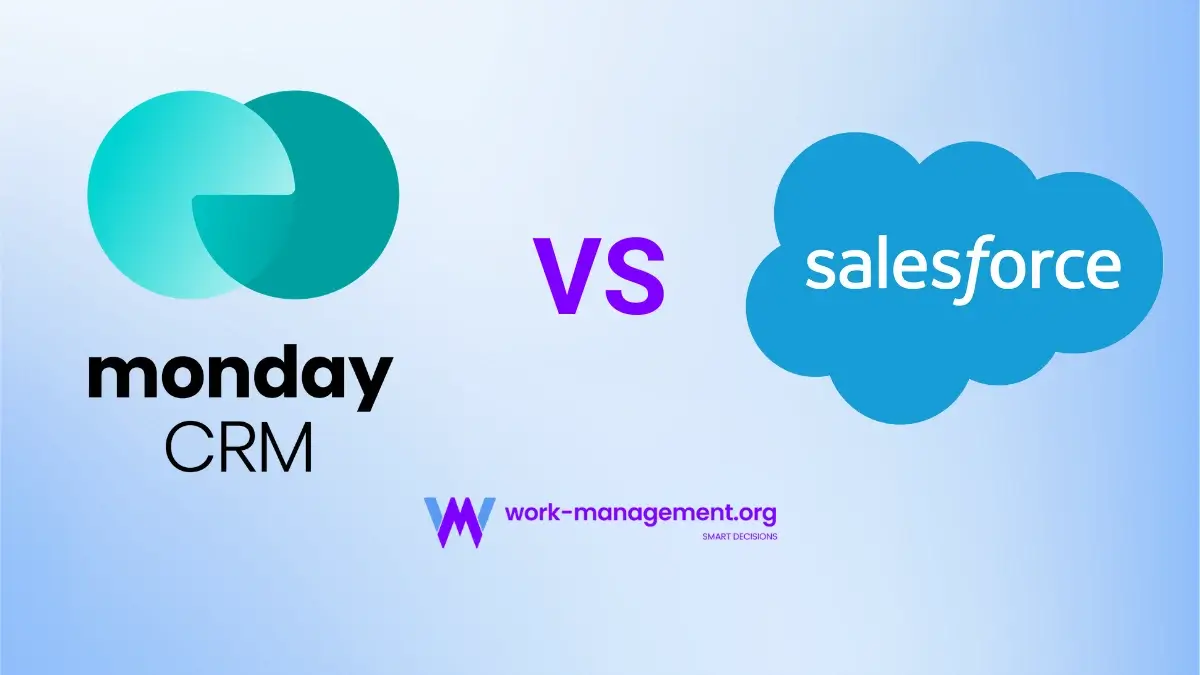
Introduction
monday CRM vs Salesforce price comparison shows an immediate difference – monday CRM starts at just $12 per seat monthly, while Salesforce begins at $25 per user. This price gap marks only the start of the cost difference when looking at CRM options for 2025. User satisfaction ratings add another layer to the story, with monday CRM earning 4.6/5 on G2 versus Salesforce’s 4.3/5. The most crucial money factor exists beyond initial pricing – monday CRM includes all features in its stated price, while Salesforce typically requires extra payments for what many would consider essential features. Small to medium-sized businesses monitoring expenses find this distinction particularly important. The price difference grows even more significant at higher levels, with Salesforce’s Unlimited plan costing $300 per user monthly compared to monday’s Pro plan at just $28 per seat. Moreover, monday CRM delivers unlimited pipelines, contacts, and boards even in its Basic plan, while Salesforce distributes these features differently across its pricing tiers. If you need to decide which CRM will save you more money in 2025 while providing the functionality your business requires, this comparison breaks down all the key cost factors to help you make the right choice.
Pricing Breakdown
Understanding the true pricing structures of monday CRM and Salesforce means looking beyond advertised rates. Here’s exactly what you’ll pay for each platform and what features you receive across different pricing tiers.
monday CRM Pricing Tiers: Basic to Enterprise
monday CRM presents a clear tiered pricing model with four main options:
- Basic: $12 per seat monthly (billed annually), offering unlimited pipelines, contacts, boards, and a dashboard based on one board
- Standard: $17 per seat monthly (annually), adding email integrations, advanced account management, quotes/invoices, and 250 monthly automations
- Pro: $28 per seat monthly (annually), including sales forecasting, email templates, sales analytics, and 25,000 monthly automations
- Enterprise: Custom pricing with advanced features like lead scoring, team goals, and HIPAA compliance
monday CRM requires a minimum of three seats for paid plans, making the actual starting price $36 monthly for the Standard plan when billed annually. All plans include unlimited free viewers with read-only access to your data.
Salesforce Pricing Tiers: Starter to Unlimited
Salesforce structures pricing with higher entry points but more enterprise-focused capabilities:
- Starter Suite: $25 per user monthly (billed annually), includes simplified onboarding and basic lead management
- Professional/Pro Suite: $75-$100 per user monthly (annually), adding customizable dashboards and forecasting
- Enterprise: $150-$165 per user monthly (annually), providing advanced analytics, pipeline management, and workflow approval
- Unlimited: $300-$330 per user monthly (annually), offering all Salesforce capabilities and premium support
- Einstein 1 Sales: $500 per user monthly (annually), incorporating advanced AI capabilities
Unlike monday CRM, Salesforce requires an annual payment upfront for most plans except the Essentials plan. This creates a significant financial commitment, especially for growing teams.
Hidden Costs: Add-ons, AI, and Integrations
Advertised rates rarely tell the complete story. Many businesses encounter budget surprises through hidden costs:
| Feature Type | monday CRM | Salesforce |
| AI Capabilities | Added cost, starts at the Enterprise tier | Not specified in the data |
| Storage Overage | +20% of the license cost | $125/month per 500MB |
| 24/7 Support | Included | +20% of license cost |
| Mobile Access | Included | Some features require +$50/user/month |
Salesforce offers numerous add-ons that significantly increase total investment:
- Einstein AI: From $75 per user monthly
- Sales dialer capabilities: Additional cost
- Configure, Price, Quote (CPQ): From $75 per user monthly
- Revenue Intelligence: From $220 per user monthly
Your final Salesforce bill could be substantially higher than the base price, depending on which features you need.
Free Trials and Entry-Level Affordability
Before committing to either platform, test drive their capabilities:
- monday CRM offers a 14-day free trial of full features with no credit card required
- Salesforce provides a 30-day free trial of Sales Cloud without requiring installation
Small teams watching their budget find monday CRM more accessible at the entry level. At $12 per seat monthly (Basic plan), it costs less than half of Salesforce’s $25 Starter tier. monday immediately provides unlimited pipelines, contacts, and boards even in its Basic plan, while Salesforce distributes these capabilities differently across tiers.
The value proposition differs fundamentally between platforms. monday CRM includes more features in base pricing, while Salesforce follows an add-on pricing model where many capabilities require additional investment. This distinction becomes particularly important when calculating the total cost of ownership over several years, especially as your team grows and needs more sophisticated CRM functionality.
Feature Value for Money
“While Salesforce is robust and comprehensive, monday has similar features without add-on services and high prices.” – Business.com, Business software review platform
The true value of CRM software comes from what features you receive for your money. Monday CRM and Salesforce offer different feature sets at various price points, creating notable differences in overall value.
Automation Capabilities: Built-in vs Add-on
Monday CRM includes powerful built-in automation options across all pricing tiers. The platform lets you create custom automations using an intuitive drag-and-drop interface that triggers actions to streamline daily tasks, improve collaboration, and save time on repetitive work. Even the Standard plan includes 250 monthly automations, scaling up to 25,000 in the Pro plan.
Salesforce offers more extensive automation capabilities but typically requires a higher investment. Its workflow automation, lead tracking, and task assignments are powerful yet often limited to premium tiers. Salesforce’s automation features are significantly more complex yet potentially more powerful for enterprises with sophisticated needs.
AI Tools: monday AI Assistant vs Einstein GPT
AI capabilities represent a key value factor in 2025‘s CRM landscape. Monday’s AI assistant comes included in paid plans without additional costs, offering capabilities like:
- Formula building assistance
- Email composition
- Text summarization into bullet points
- Template generation
Salesforce’s Einstein GPT provides more advanced AI functionality but at an additional cost. Einstein offers predictive analytics, intelligent recommendations, and automated insights, with pricing starting at $75 per user monthly as an add-on. For enterprise-scale AI capabilities, you’ll need to invest in the Einstein 1 Sales tier at $500 per user monthly.
| AI Feature | monday CRM | Salesforce |
| Included in base price | Yes | No |
| Email composition | Yes | Yes (premium) |
| Text summarization | Yes | Yes (premium) |
| Sales predictions | Basic | Advanced |
| Cost structure | Included | Add-on pricing |
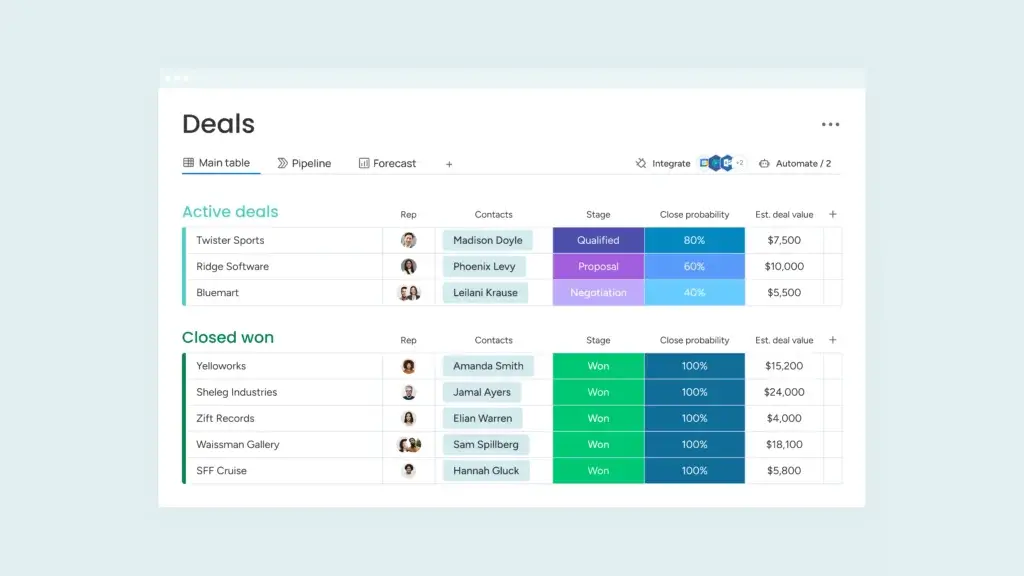
Sales Tools: Pipelines, Forecasting, and Dashboards
Both platforms provide essential sales management tools, though with different approaches to value. Monday CRM delivers unlimited customizable pipelines and contacts even at its Basic tier. Its sales forecasting tools grant visibility into buyer interactions and generate trusted revenue projections.
Salesforce offers more sophisticated forecasting capabilities, yet they’re primarily available at higher pricing tiers. Its pipeline inspection provides comprehensive views of sales opportunities with AI-powered insights, although these features generally start at the Professional tier ($75-$100 per user).
First thing to remember, dashboard functionality differs substantially between platforms. Monday emphasizes visual simplicity with real-time insights into pipeline status, whereas Salesforce offers highly customizable but more complex dashboards requiring greater implementation effort.
Customization and Scalability
Despite being more affordable, monday CRM doesn’t sacrifice customization. The platform allows you to:
- Tailor pipelines and stages to match unique sales processes
- Create customized workflows and automations
- Develop tailored dashboards for specific metrics
Salesforce excels in extensibility with its vast AppExchange marketplace and developer tools, yet maximizing these capabilities often requires technical expertise and additional investment. As a result, monday typically provides better immediate value for small-to-medium businesses, while Salesforce scales more effectively for enterprise needs with complex requirements.
Above all, monday CRM typically delivers more comprehensive features at each price point without requiring add-on purchases. For businesses seeking rapid implementation and predictable costs, monday represents superior value, particularly for teams without extensive technical resources.
Ease of Use
“For every $1 you spend on Salesforce licenses, you can expect to spend $6 on implementation and maintenance.” – Fruition Services, CRM implementation and consulting firm
The actual platform cost forms just one part of your CRM investment picture. Hidden expenses tied to training, setup time, and user adoption impact your overall ROI just as significantly.
Learning Curve: monday’s Simplicity vs Salesforce’s Complexity
User interface experiences differ drastically between these platforms. monday CRM has built a reputation for intuitive design, with G2 users describing it as “extremely user-friendly and uncomplicated”. Team members who approach technology cautiously adapt quickly to monday’s straightforward layout. The drag-and-drop interface needs minimal technical knowledge, making it ideal for small businesses without dedicated IT staff.
Salesforce presents a steeper learning curve by comparison. Users often report that “the platform’s user interface and navigation are complex or overwhelming, requiring significant training and onboarding time”. This complexity reflects Salesforce’s extensive customization capabilities and feature depth rather than being a universal drawback. Still, this sophistication translates to higher initial training investments.
Training and Setup Time: Internal vs External Resources
Implementation timeframes vary considerably between platforms:
| Factor | monday CRM | Salesforce |
| Small business implementation | ~3 months | 3-6+ months |
| Team training approach | Often managed internally | Frequently requires consultants |
| Technical expertise needed | Minimal | Moderate to high |
| Configuration complexity | Low to moderate | Moderate to high |
Small businesses with around 10 employees typically complete monday CRM implementation in about three months. The platform’s simplicity allows many organizations to handle training internally, reducing costs significantly compared to hiring external consultants.
Salesforce implementation demands more resources. Organizations typically find that “many third-party consultants on the market specialize in CRM training” are necessary for successful adoption. This external expertise increases your total investment substantially beyond subscription fees.
Your team’s technical proficiency influences implementation timeframes. As one expert notes, “Employees with prior CRM experience can significantly speed up adoption across the organization”. Teams with limited CRM experience need additional training time, particularly with Salesforce’s more complex interface.
Template Availability and Pre-built Workflows
Ready-made templates and workflows accelerate implementation dramatically. Both platforms offer pre-configured solutions with different approaches.
monday CRM provides numerous “easy-to-launch templates and boards that make onboarding a breeze”, letting you quickly establish customer management, sales pipelines, and product catalogs. This template library targets non-technical users who need functioning workflows without extensive customization.
Salesforce offers an extensive template library but requires more technical expertise for effective implementation. The platform provides “pre-packaged and already assembled templates” for various business processes, yet configuring these templates demands greater technical know-how.
The value of these template libraries depends largely on your team’s technical capabilities. Organizations with limited IT resources find monday’s straightforward templates offer faster time-to-value. Teams with dedicated technical staff might better leverage Salesforce’s more sophisticated but complex template options.
The complexity difference extends to customization as well. In monday CRM, “automations can be customized in just a few clicks, meaning you can create powerful workflows in a few minutes”. This approach enables rapid implementation without specialized training, an advantage for resource-constrained teams.
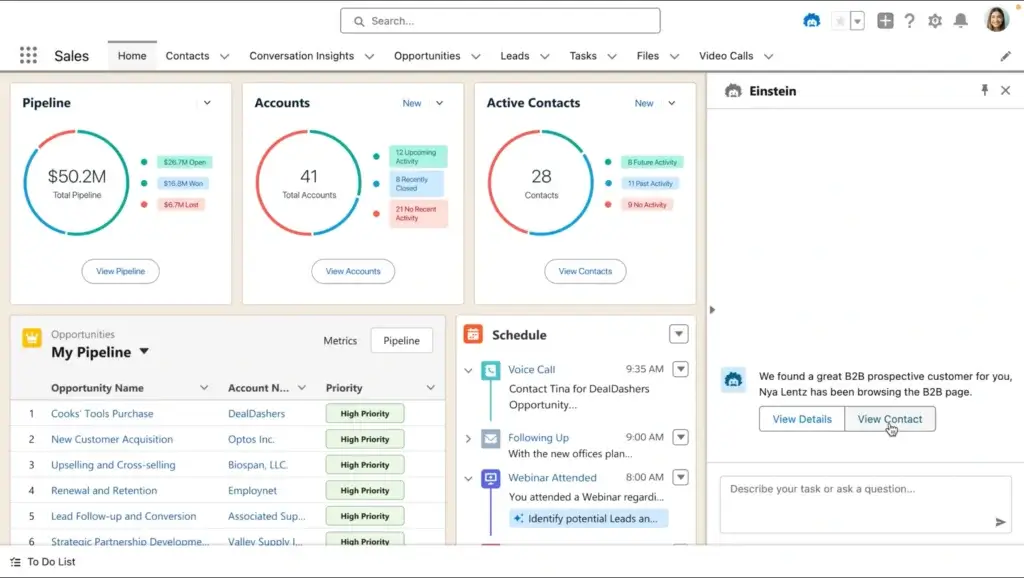
Integration Ecosystem
Integration options often determine how smoothly a CRM system fits with your existing tech stack. The ability to connect with other business tools affects both functionality and total cost of ownership beyond the core platform.
Number of Integrations: 200+ vs 3,000+
Integration ecosystem size varies dramatically between these platforms. monday CRM offers access to over 200 apps and integrations, focusing on the most commonly used business tools. These include email services like Gmail and Outlook, document tools like PandaDoc and DocuSign, payment systems such as Stripe, and marketing solutions including Facebook lead generation and Mailchimp.
Salesforce provides 3,000+ integrations through its AppExchange, organized by industry for easier browsing. This extensive marketplace connects to SurveyMonkey, LinkedIn, Asana, and many other specialized tools. Looking at these numbers alone, Salesforce might seem superior, yet quantity doesn’t always mean better functionality for your specific needs.
Third-party App Costs and API Access
API integration costs remain a significant yet overlooked expense factor. API integration typically costs between $20,000 to $200,000, depending on industry complexity, with healthcare integrations potentially exceeding $1 million due to regulatory requirements. Beyond initial development, ongoing maintenance requires hundreds of engineering hours yearly, approximately 300 hours for a single integration.
For most companies, these figures equal roughly $50,000 yearly in personnel costs and partnership fees per integration. These expenses impact both platforms but typically affect Salesforce users more heavily due to the platform’s complexity.
API developer rates differ significantly by region:
- North America: $60-130/hour
- Western Europe: $70-90/hour
- Eastern Europe: $35-70/hour
- Asia: $20-40/hour
Zapier and Make Support for monday CRM
Despite fewer native integrations, monday CRM extends its connectivity through robust Zapier support. This integration lets you connect monday.com with thousands of applications without coding knowledge. Zapier bridges the gap between monday CRM and apps lacking direct integrations.
You can automatically create monday.com items from Calendly invitations, parse email data into monday boards, or sync contacts between monday and email marketing platforms like Mailchimp, Flodesk, or Constant Contact. These workflows, called Zaps, typically take under six minutes to set up, saving substantial time.
Make (formerly Integromat) offers similar connectivity options, further expanding monday CRM’s ecosystem. Together, Zapier and Make multiply monday’s integration capabilities without expensive custom development.
Customer Support
Support options often make a crucial difference in CRM implementation success. Beyond features and pricing, effective customer support can determine whether your team thrives or struggles with a new system.
Support Availability: 24/7 Access vs Tiered Plans
The availability of technical assistance varies dramatically between these platforms. monday CRM provides 24/7 customer support through a ticketing system across all pricing plans. This universal access ensures that teams can get help regardless of when issues arise or which subscription level they’ve purchased.
In contrast, Salesforce structures support based on how much you pay. Their standard support comes with basic plans, yet comprehensive 24/7 assistance requires purchasing premium support at an additional 20% of your license cost. This tiered approach means smaller organizations with lower-tier plans may face longer response times during critical situations.
Dedicated Account Managers and Onboarding Help
High-quality onboarding dramatically reduces implementation headaches. monday CRM assigns dedicated customer success managers to Enterprise plan users, providing personalized guidance during setup and beyond.
Salesforce offers different levels of personalized success plans that are either included in higher-tier plans or charged separately. These might include:
- Expert coaching
- Proactive services
- Implementation assistance
Both platforms recognize the importance of initial configuration. Having a dedicated account manager helps ensure your CRM is properly customized to complement your organization’s workflow, “ensuring a smooth transition” into daily operations.
Community, Webinars, and Knowledge Base
Self-service resources determine how quickly your team can solve problems independently. monday CRM offers extensive documentation through:
| Resource Type | monday CRM | Salesforce |
| Knowledge Base | Comprehensive articles | Extensive documentation |
| Video Resources | Tutorial library | Guided learning paths |
| Community Forums | Active user discussions | Extensive user community |
| Webinars | Regular training sessions | Specialized topic coverage |
Salesforce’s knowledge base functions as a “centralized digital information hub” that helps “deflect cases, giving service reps more time” to handle complex issues. Both platforms offer robust self-help options, yet the accessibility and depth of these resources can significantly impact your team’s adoption speed.
User Reviews
Real user experiences tell more about a CRM’s value than marketing materials ever could. When looking at customer feedback, clear patterns emerge showing which platform delivers better return on investment in actual business settings.
G2 Ratings: 4.6 vs 4.3
Customer satisfaction scores reveal platform quality. monday CRM currently holds a 4.6/5 rating on G2 from over 4,000 reviews. Salesforce has earned a 4.3/5 rating from more than 12,000 reviews. This rating difference, while appearing small, shows a meaningful gap in user satisfaction between the platforms.
Common Praise and Complaints
Users highlight specific strengths and weaknesses for each platform:
| Platform | Common Praise | Common Complaints |
| monday CRM | “Best all-in-one CRM,” “Extremely customizable,” “Visual appeal” | Requests for more integrations, Learning curve for new users |
| Salesforce | “Powerful platform,” “Flexible,” “Robust integrations” | “Complicated,” “Overwhelming,” “Not intuitive,” “High price tag” |
monday CRM earns significant praise for its user interface and design, qualities that directly affect daily productivity. Reviewers often describe monday as “robust and capable” while remaining accessible. Salesforce users value its extensive capabilities but frequently express frustration with its complexity and cost structure.
Case Studies: SMBs Saving with monday CRM
Small-to-medium businesses report impressive ROI figures when using monday CRM:
- KC Petroleum achieved 18x ROI with improved visibility into customer relationships
- BHN realized 2x ROI while conserving valuable human resources[272]
- TodayTix Group reported 15x ROI through enhanced business flexibility[272]
- FARFETCH documented 6x ROI by centralizing their operations[272]
- Motorola’s creative team measured a 346% increase in ROI[272]
Beyond direct financial returns, organizations report operational improvements including:
- 25% increase in efficiency at Country Road Group[272]
- 28% increase in speed to market at Vistra[272]
- McDonald’s Australia reduced project management timelines by 25%[272]
- 60% improvement in sales tracking capabilities[272]
These case studies show monday CRM’s particular strength with small-to-medium businesses seeking cost-effective solutions with minimal implementation overhead.
Comparison Table
Monday CRM vs Salesforce Comparison Table
| Feature/Aspect | monday CRM | Salesforce |
| Starting Price | $12/seat/month | $25/user/month |
| Highest Tier Price | $28/seat/month (Pro) | $500/user/month (Einstein 1 Sales) |
| G2 Rating | 4.6/5 | 4.3/5 |
| Minimum Seats | 3 seats required | Not specified |
| Free Trial | 14 days, no credit card | 30 days |
| Basic Features | – Unlimited pipelines – Unlimited contacts – Unlimited boards – Dashboard (1 board) | – Basic lead management – Simplified onboarding |
| AI Capabilities | Included in plans (500 credits/month) | Additional cost (starts at $75/user/month) |
| 24/7 Support | Included in all plans | +20% of license cost |
| Mobile Access | Included | Some features require +$50/user/month |
| Implementation Time | ~3 months | 3–6+ months |
| Number of Integrations | 200+ | 3,000+ |
| Technical Expertise Required | Minimal | Moderate to high |
| Storage Overage | Not specified | $125/month per 500MB |
| Automation Limits | – Standard: 250/month – Pro: 25,000/month | Varies by tier |
| Training Approach | Often managed internally | Frequently requires consultants |
Conclusion
After comparing monday CRM and Salesforce across various aspects, the financial benefits of monday CRM stand out clearly. While Salesforce offers an extensive feature set and wide integration options, monday CRM delivers better value for businesses watching costs. From base pricing to implementation expenses, monday presents a stronger case as the more cost-effective option.
Monday’s Basic plans starting at just $12 per seat versus Salesforce’s $25 entry point show the notable price difference right away. This gap becomes even wider at higher levels, with monday’s Pro plan maxing at $28 per seat while Salesforce’s Unlimited and Einstein plans reach $300-$500 per user monthly. Monday also includes key features like AI tools, unlimited pipelines, and 24/7 support without extra costs that often increase Salesforce’s total price.
Beyond subscription costs, setup expenses tell another important part of the story. Monday’s user-friendly interface allows faster adoption with less training needed, usually letting businesses handle onboarding internally instead of hiring expensive consultants. Your team can reach full productivity faster with monday while avoiding the major hidden costs often linked to Salesforce setup.
User feedback further supports monday as the budget-friendly choice. With a G2 rating of 4.6/5 compared to Salesforce’s 4.3/5, users clearly prefer monday’s CRM approach. Case studies show impressive ROI results, with some businesses seeing up to 18x return on their monday CRM investment.
Though Salesforce provides more extensive customization options and a larger integration marketplace, these advantages come with much higher costs for both platform fees and setup resources. Unless your business needs highly specialized enterprise features, monday CRM represents the smarter money decision for 2025.
Your choice depends on your specific business requirements and growth plans. Small to medium-sized businesses will find Monday CRM offers the right balance of features and affordability, while larger enterprises with complex needs might justify Salesforce’s premium costs. As budgets tighten and efficiency becomes more important, monday’s approach of providing full features without premium pricing makes it the clear winner for cost-conscious businesses seeking maximum value from their CRM investment.
FAQ
Which CRM offers better value for money in 2025: monday CRM or Salesforce?
monday CRM generally offers better value for money, especially for small to medium-sized businesses. It provides comprehensive features at a lower price point, with plans starting at $12 per seat compared to Salesforce’s $25 entry point. Monday CRM also includes essential features like AI capabilities and 24/7 support without requiring additional purchases.
How do the implementation costs compare between monday CRM and Salesforce?
monday CRM typically has lower implementation costs due to its intuitive interface and simpler setup process. Many businesses can handle onboarding internally, while Salesforce often requires expensive consultants. This results in faster adoption and lower overall costs for monday CRM users.
What are the key differences in pricing structures between monday CRM and Salesforce?
monday CRM offers a more straightforward pricing structure with fewer tiers and most features included in the base price. Salesforce has a more complex pricing model with multiple tiers and many features available as paid add-ons. This can lead to significant cost differences, especially for growing teams.
How do user ratings compare between monday CRM and Salesforce?
monday CRM currently holds a slightly higher user rating on G2, with 4.6/5 stars compared to Salesforce’s 4.3/5. Users often praise monday CRM for its user-friendly interface and visual appeal, while Salesforce receives recognition for its powerful features but also criticism for its complexity.
Can monday CRM handle complex business needs like Salesforce?
While Salesforce offers more extensive customization and a larger integration ecosystem, monday CRM provides robust features suitable for most small to medium-sized businesses. Unless a company requires highly specialized enterprise features, monday CRM can effectively handle a wide range of business needs while offering significant cost savings.




